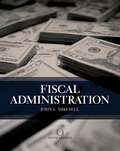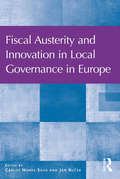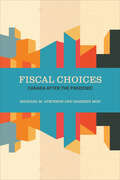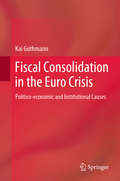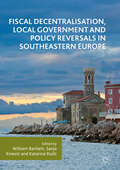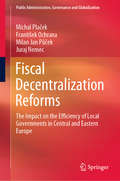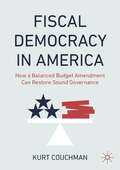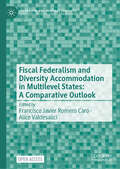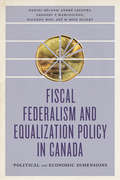- Table View
- List View
First: Sandra Day O'Connor
by Evan ThomasThe intimate, inspiring, and authoritative biography of Sandra Day O’Connor, America’s first female Supreme Court justice, drawing on exclusive interviews and first-time access to Justice O’Connor’s archives—by the New York Times bestselling author Evan Thomas. <P><P>She was born in 1930 in El Paso and grew up on a cattle ranch in Arizona. At a time when women were expected to be homemakers, she set her sights on Stanford University. When she graduated near the top of her law school class in 1952, no firm would even interview her. But Sandra Day O’Connor’s story is that of a woman who repeatedly shattered glass ceilings—doing so with a blend of grace, wisdom, humor, understatement, and cowgirl toughness. <P><P>She became the first ever female majority leader of a state senate. As a judge on the Arizona Court of Appeals, she stood up to corrupt lawyers and humanized the law. When she arrived at the United States Supreme Court, appointed by President Ronald Reagan in 1981, she began a quarter-century tenure on the Court, hearing cases that ultimately shaped American law. <P><P>Diagnosed with cancer at fifty-eight, and caring for a husband with Alzheimer’s, O’Connor endured every difficulty with grit and poise. Women and men who want to be leaders and be first in their own lives—who want to learn when to walk away and when to stand their ground—will be inspired by O’Connor’s example. This is a remarkably vivid and personal portrait of a woman who loved her family, who believed in serving her country, and who, when she became the most powerful woman in America, built a bridge forward for all women. <P><b>A New York Times Bestseller</b>
Fiscal Adjustment for Stability and Growth
by James DanielA report from the International Monetary Fund.
Fiscal Adjustment in Sudan Size, Speed, and Composition
by Kenji Moriyama S. M. Ali Abbas Abdul NaseerA report from the International Monetary Fund.
Fiscal Administration Analysis and Applications for the Public Sector
by John L. MikesellEver wonder how federal finance really works? FISCAL ADMINISTRATION, Ninth Edition, shows you how public budgets operate and gives you the opportunity to crunch the numbers. With actual data from the U. S. federal budget, including its breakdown, you can see for yourself how policymakers allocate money. Each chapter illustrates concepts and issues with case studies from the private sector as well as from public finance.
Fiscal And Economic Implications Of Strategic Defenses
by Barry M BlechmanEstimates of the potential costs of alternative strategic defense systems should be an intrinsic element in decisions about whether the US should develop and deploy these systems, especially because of the ''opportunity costs' 'involved-what the nation would have to forgo in other military or civilian programs or in private resources because of higher taxes or larger deficits. In this book, the authors describe four notional strategic defense systems, each with a different ambitious objective, and then estimate their costs
Fiscal Austerity and Innovation in Local Governance in Europe
by Carlos Nunes Silva Ján Bu?ekFollowing the financial crisis and subsequent impacts of economic slowdown and austerity, the emergence of new local governance models and innovation is a very timely issue. The same goes for identifying new types of funding schemes and fiscal models prompted by austerity with the reduction in financial resources for local governments. This book offers a broad perspective on some of the organizational and financial problems faced by cities and local governments across Europe and analyses the reactions and reforms implemented to address current economic and public finance conditions. The geographical coverage of the case studies, multidisciplinary background of the contributing authors and focus on a multiplicity of issues and challenges that confront local governments, not just financial issues as is often the case, means this book is relevant to a wide readership. The book is written for post-graduate students, advanced undergraduates, and researchers in the multidisciplinary field of local government studies (Public Administration, Geography, Political Science, Law, Economy and Sociology), as well as practitioners working in local government institutions.
Fiscal Choices: Canada after the Pandemic (The Johnson-Shoyama Series on Public Policy)
by Michael M. Atkinson Haizhen MouThe COVID-19 pandemic revealed that governments can quickly respond to a fiscal crisis without becoming mired in unproductive wrangling. But the pandemic has also revealed the limits of traditional policy instruments in stabilizing the economy, controlling inflation, and fostering economic growth. Fiscal Choices sheds light on the economic dimensions of COVID-19 and examines the state of Canada’s fiscal policy and fiscal health following the pandemic. The book covers a cluster of key fiscal policy topics: the overall capacity of government, the growth of inequalities, the management of sovereign debt, and the troubled institutions of federalism and parliamentary government. The book draws upon candid, in-depth interviews with over 70 former and current politicians, public servants, and academic experts who aim to establish a sustainable future within an accountable political system. The book argues that although those who are entrusted with the instruments of power are intelligent and well meaning, they are reluctant to take risks or abandon well-known, if poorly performing, formulas. It concludes with a set of predictions and prescriptions rooted in a realistic interpretation of Canada’s political economy. Ultimately, Fiscal Choices presents a sober assessment of federalism and parliamentary government as instruments of democratic accountability.
Fiscal Consolidation in the Euro Crisis: Politico-economic and Institutional Causes
by Kai GuthmannThis book sheds new light on if and why, between 2009 and 2015, European governments succeeded or failed in initiating and actually realizing some of the farthest-reaching austerity plans in modern history. The author analyzes the economic and political context and the underlying causes of austerity and economic adjustment packages during the Euro crisis. In doing so, he shows that austerity has its roots in an institutional mismatch between capitalist diversity in the Eurozone on the one hand, and an ill-conceived common economic regime on the other. In this context, austerity trumped politics, and even democracy itself. The book will appeal to scholars of political science and comparative political economy, as well as governmental policymakers and practitioners in the finance sector.
Fiscal Control of Pollution: Application of Ecotaxes in India (India Studies in Business and Economics)
by Rajat VermaThis volume analyses the process and structure of ecotaxes in India to bring forth its rationale, application and incidence on emerging environmental problems on the backdrop of the environmental issues confronted by the Indian economy. Being at infant stage in India, the concept of ecotaxes is plagued with large empirical difficulties. This book provides a holistic understanding of the complexities in the design and implementation of these fiscal instruments at the country level. After elaborating on the theory, history of its applications, the book provides an innovative methodological exercise. It examines the adequacy and relevance of ecotaxation in the Indian context, along with ensuring that the distortions due to the proposed levy are minimised. The incidence of these taxes on the households, the double dividend hypothesis and the effect on competitiveness of the producer are a few of the core themes elaborated upon in this book. This is demonstrated through a linear general equilibrium framework of Environmentally extended Social Accounting Matrix (E-SAM).The book provides material for the researchers and graduate students on the methodological structure of eco-taxes. The proposed methodological intervention could be utilised by the researchers who wish to analyse the macroeconomic impact of any tax through the framework of Social Accounting Matrix (SAM). Additionally, the process as well as the implications and nuances provided in the book will assist the policy makers to design innovative policies for dealing with environmental issues. The volume also has something for the practitioners by helping them comprehend various effects of these instruments on different stake holders of the economy and thus will be useful as a policy prescription. The three policy scenarios analysed in this study could be considered by the policymakers while attempting to design these instruments in the Indian context and thus ending the extensive reliance on the age old and grossly ineffective Command and Control (CAC) Policies.
Fiscal Coverage in the Countries of the Middle East and Central Asia: Current Situation and a Way Forward
by Daria ZakharovaA report from the International Monetary Fund.
Fiscal Cycles in the Caribbean
by Juliana Dutra AraujoA report from the International Monetary Fund.
Fiscal Decentralisation, Local Government and Policy Reversals in Southeastern Europe
by William Bartlett Sanja Kmezić Katarina ĐulićThis edited collection provides a comprehensive geographic and chronological overview of the decentralisation processes in the successor states of former Yugoslavia and Albania during their transition and EU integration years, from 1990 until 2016. These countries present a unique laboratory for the analysis of economic, social and political change, having traversed armed conflicts, dramatic economic and political changes, and EU pre-accession processes involving deep institutional reform. They have also endured the Eurozone crisis, which has led to high levels of unemployment, wide fiscal gaps and dangerously high levels of indebtedness. Observing the quarter century-long transition from socialism to capitalism through the prism of decentralisation sheds new light on studying the political economy of the region and the current status of the individual countries in terms of economic development and their EU integration progress. The contributors enrich the wider literature on fiscal decentralisation in transition countries by exploring several broad questions on democratisation, the political economy of post-communist transition, the role of external actors in policy transfer and the issue of financial stability in the post-crisis period.
Fiscal Decentralization Reforms: The Impact on the Efficiency of Local Governments in Central and Eastern Europe (Public Administration, Governance and Globalization #19)
by Juraj Nemec Michal Plaček František Ochrana Milan Jan PůčekThis book examines the impacts of fiscal decentralization reforms on the efficiency of local governments in Central and Eastern European (CEE) countries. By offering a comparative perspective and by applying econometric methods and regression models, it analyses various reform trajectories and their effects on individual CEE countries. Furthermore, the book discusses input and output indicators for evaluating the efficiency of municipalities. Readers will learn about the common features of these countries, the impact of path dependence, and future prospects for decentralization reforms. In closing, the book discusses modern management and administration methods, opportunities for cooperation between municipalities, co-creative service delivery, and other measures that could improve the efficiency of public service provision.
Fiscal Decentralization and Development
by Hiroko UchimuraAn in-depth analysis of the fundamental role that decentralization plays in developing countries, using detailed statistical data to examine the actual fiscal structure between tiers of government, and the effects of decentralization at the local, national and international levels.
Fiscal Decentralization and Local Public Finance in Japan (Routledge Frontiers Of Political Economy Ser. #Vol. 107)
by Nobuki MochidaThe intergovernmental fiscal issue is highly relevant given the worldwide movement toward more decentralized governance in both industrial and developing countries. Over the course of five decades Japan has developed a robust system of decentralized governance. This book investigates fiscal decentralization and local finance in Japan wi
Fiscal Democracy in America: How a Balanced Budget Amendment Can Restore Sound Governance
by Kurt CouchmanThis book explores the U.S. federal government&’s need for binding budget targets to recover fiscal sustainability and boost economic growth. It details the flaws in past balanced budget amendment proposals, outlines the features of a promising new approach with broad appeal, and how the amendment might be adopted and implemented in today's political climate. Even as the U.S. economy expands, the federal government continues to run large and growing budget deficits that exceed $2 trillion per year and a debt burden eclipsing annual economic output. With debt pressures continuing to grow, Congress is almost certain to return to considering a constitutional amendment to bring the federal government&’s spending and revenue into balance. Congress has attempted to pass BBAs in the past, but none have succeeded despite their proliferation among advanced economies. In Fiscal Democracy in America, Kurt Couchman argues for a principles-based balanced budget amendment (BBA) that would let Congress phase out the gap between revenue and non-interest spending over a 10-year period to restore fiscal space for emergencies while encouraging Congress to overhaul the dysfunctional federal budget process. Couchman explores America's financial history, the dangers of high and rising debt burdens, and examples of other countries, state governments, and the U.S. federal government itself moving toward healthier budgeting practices. He particularly seeks to lay out neutral, predictable rules for sound governance so that members of Congress can holistically and responsibly manage federal spending and tax policies to provide ever-greater value for the American people. Aimed at policymakers and the public across the political spectrum, Couchman's proposals would guide America toward a more prosperous and democratic future.
Fiscal Dimensions of Sustainable Development
by Sanjeev Gupta Kevin Fletcher Michael Keen Benedict Clements Luiz De Mello Muthukumara ManiA report from the International Monetary Fund.
Fiscal Federalism
by Robin Boadway Anwar ShahThis book provides a comprehensive account of the principles and practices of fiscal federalism based on the currently accepted theoretical framework and best practices. The traditional topics of assignment of responsibilities, intergovernmental fiscal arrangements, fiscal competition, and grants are covered in a unified framework with reference to actual practices followed in federations around the world. Special issues such as local government and the implications of natural resource issues are considered along with emerging issues such as governance, corruption, and the effect of globalization and the information revolution on the nation state. The treatment is non-technical and suitable for a wide variety of audiences, including scholars, instructors, students, policy advisors, and practitioners.
Fiscal Federalism and Diversity Accommodation in Multilevel States: A Comparative Outlook (Federalism and Internal Conflicts)
by Alice Valdesalici Francisco Javier Romero CaroThis open access edited book connects two strands of federal studies, fiscal federalism, and diversity accommodation, to answer two closely interrelated questions. The first of these is to what extent has the need to accommodate diversities determined financial relations and their evolution? The authors answer this question by conducting a thorough investigation of the types of diversity that drive such evolution. The second question is does fiscal federalism have a broadly positive or negative impact on the accommodation of diversities, by producing institutional solutions that either integrate a federal system or pull it apart? Through contributions from experts in law, economics, and political science, the book uses a series of case studies to establish a theoretical framework for exploring the relationship between fiscal federalism and diversity accommodation. The authors lay the groundwork for a comparative study of this relationship in multilevel states.
Fiscal Federalism and Equalization Policy in Canada: Political and Economic Dimensions
by Gregory P. Marchildon André Lecours Daniel Béland Haizhen Mou M. Rose OlfertFiscal Federalism and Equalization Policy in Canada aims to increase public understanding of equalization and fiscal federalism by providing a comparative and multidisciplinary perspective on the history, politics, and economics of equalization policy in Canada. The authors provide a brief history, an analysis of the politics of equalization as witnessed over the last fifteen years, and a discussion of key economic debates concerning the role of the program and its effects. They also explore the relationship between equalization and other components of fiscal federalism, particularly the Canada Health Transfer and the Canada Social Transfer. The result is an analysis that draws from the best scholarship available in the fields of economics, economic history, political science, political sociology, and public policy.
Fiscal Federalism in Canada: Analysis, Evaluation, Prescription
by André Lecours Daniel Béland Trevor Tombe Eric ChampagneFeaturing insights from some of the top specialists in the country, Fiscal Federalism in Canada unpacks numerous complexities of fiscal federalism in Canada. The book features key regional and provincial perspectives, while taking into account Indigenous realities, the three territories, and municipal affairs. The contributing authors go beyond the major federal transfers to examine the financing of education, cities, infrastructure, and housing. This volume shows that fiscal federalism is much more than simply an aggregate of individual programs and transfers. It highlights the role of actors other than the federal and provincial governments and recalls the importance of territoriality. The book pays close attention to the political dimension of fiscal federalism in Canada, which is at the heart of how the federation functions and is essential to its governance. Fiscal federalism is central to the funding of critical programs through intergovernmental transfers, but it is also the focus of political debates on territorial redistribution. In tackling essential questions, Fiscal Federalism in Canada contributes to the so-called second-generation fiscal federalism literature, taking stock of the critical sociological and political issues at its core.
Fiscal Federalism in Theory and Practice
by Teresa Ter-MinassianA report from the International Monetary Fund.
Fiscal Incentive Effects of the German Equalization System
by Annalisa Fedelino Sven Jari StehnA report from the International Monetary Fund.
Fiscal Management of Scaled-Up Aid
by Richard Allen Sanjeev Gupta Duncan Last Isabell Adenauer Kevin Fletcher Shamsuddin Tareq Gerd SchwartzThe international community has committed to scaling up aid and improving aid delivery to low-income countries to help them meet the Millennium Development Goals. Other "emerging" donors, public and private, are increasing their assistance, and debt-relief initiatives are creating space for new borrowing. Remittances to low-income countries have been on a precipitous rise, and many countries are benefiting from high commodity prices. Fiscal Management of Scaled-Up Aid explores approaches to the sound fiscal management that will be required to ensure effective and sustainable use of these flows. With a medium-term perspective and efficient use of resources in mind, this paper addresses questions that shape fiscal policy response to scaled-up aid. Drawing on IMF Fiscal Affairs Department technical assistance to member countries, it outlines factors that should be taken into account in preparing an action plan for public financial management reform and proposes specific measures that will assist countries in strengthening fiscal institutions
Fiscal Monitor
by International Monetary FundIMF staff members examine the reason for the low interest rates paid for sovereign bonds issued by the U. S. and Japan, the sustainability of fiscal improvements in emerging economies, and how long it will take to lower public debt worldwide. Appendices review the theory of fiscal devaluation, analyze past privatization transactions, and track the main determinants of stock-flow adjustments over the last three decades. Color tables and graphs are provided. Annotation ©2012 Book News, Inc. , Portland, OR (booknews. com)



